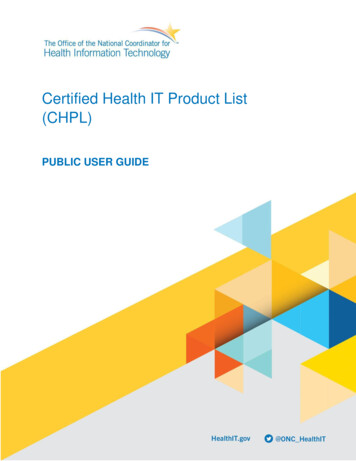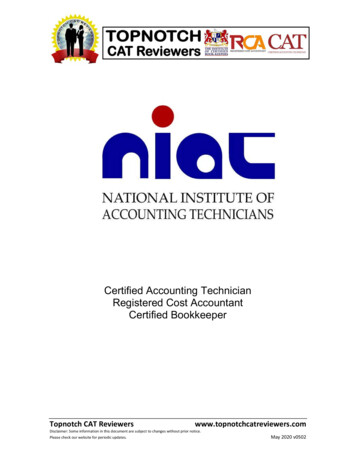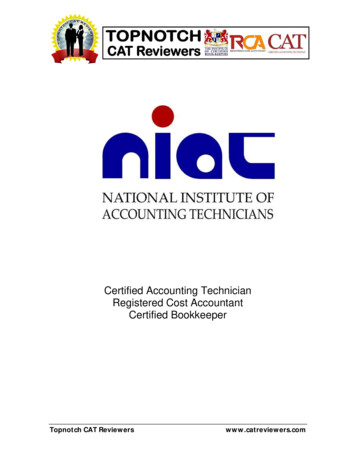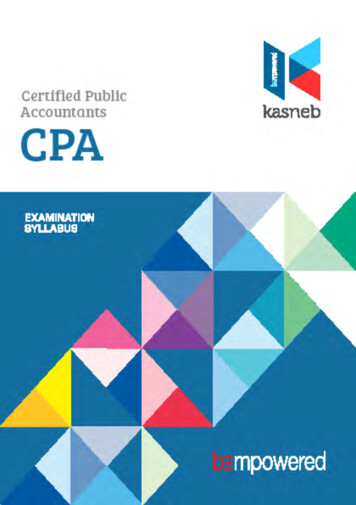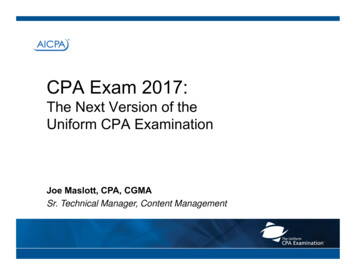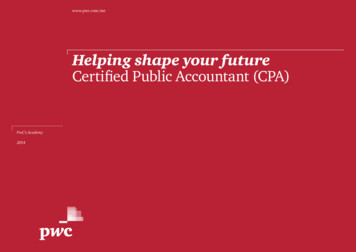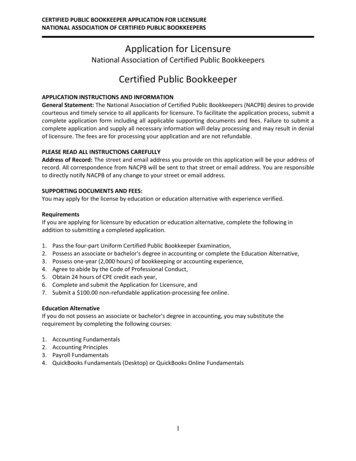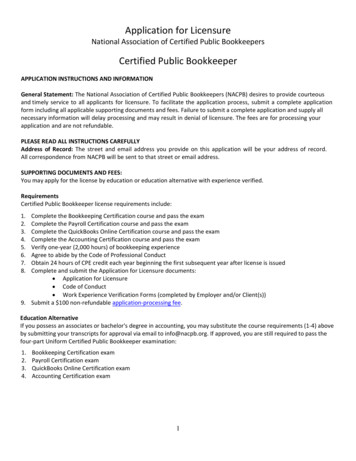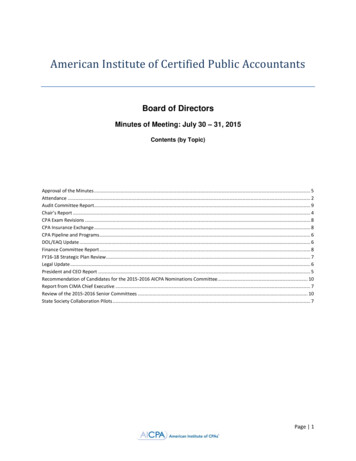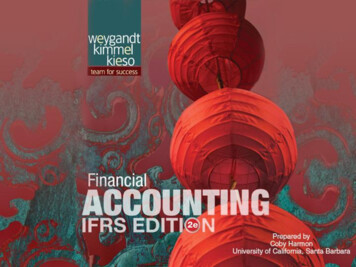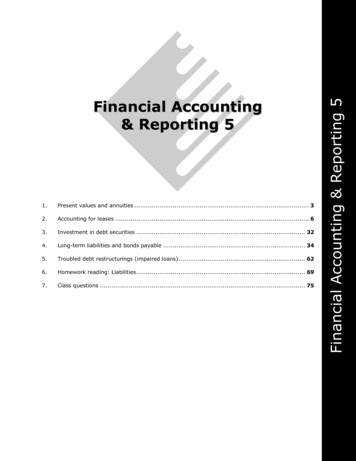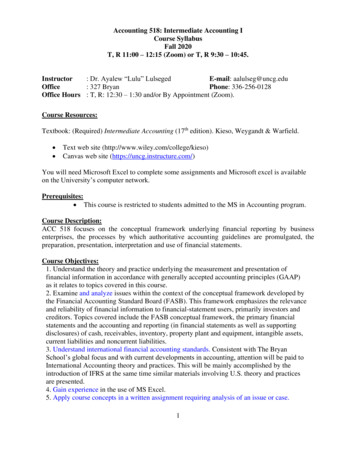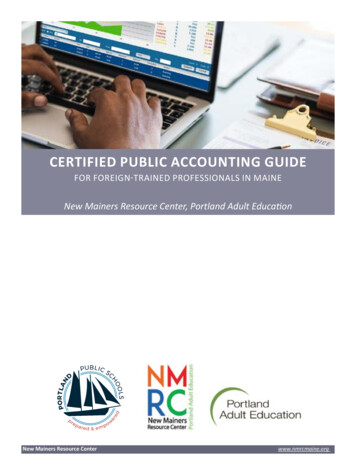
Transcription
CERTIFIED PUBLIC ACCOUNTING GUIDEFOR FOREIGN-TRAINED PROFESSIONALS IN MAINENew Mainers Resource Center, Portland Adult EducationNew Mainers Resource Centerwww.nmrcmaine.org
CERTIFIED PUBLIC ACCOUNTING GUIDEFOR FOREIGN-TRAINED PROFESSIONALS IN MAINESupport for this project was provided by the Betterment FundPrepared by:Dani M. Scherer M.Ed.October 2018New Mainers Resource Center – Who We AreThe New Mainers Resource Center (NMRC) is a program within Portland Adult Education serving area immigrantsand refugees. Our offerings are designed to help New Mainers overcome barriers in order to enter the US workforce.These include: career guidance and employment case management, assistance with credential review and licensingrequirements, intensive classes focused on job readiness skills, networking groups, workshops and other offerings.The Purpose of this GuideOne major challenge faced by skilled professionals, such as accountants, is to successfully navigate complexcertification requirements if they want to practice as Certified Public Accountants in Maine. The purpose of this guideis to provide foreign-trained accountants the information they need to make informed decisions about pursuingcertification in the field of accounting.For additional information or assistance from the New Mainers Resource Center contact:New Mainers Resource Center, Maine’s Welcome Back Center, Portland Adult Education 14 Locust St. Portland, Maine04101 Phone: 207 874-8155, Website: www.nmrcmaine.org, Email: Sally Sutton, Program Coordinator, suttos@portlandschools.org.New Mainers Resource Centerwww.nmrcmaine.org
CERTIFIED PUBLIC ACCOUNTING GUIDEFOR FOREIGN-TRAINED PROFESSIONALS IN MAINETable of ContentsOverview of the process1Do I need a license?2Education evaluation4Education deficiencies5Applying for the CPA examPassing the CPA examNew Mainers Resource Center67Work experience requirement8Applying for the certification9www.nmrcmaine.org
OVERVIEW OF THE PROCESSIf you wish to become a certified public accountant (CPA), please consult the process and requirements below.This process assumes that you have completed a bachelors degree and have worked as an accountant in acountry other than the US.1DECIDE:2EDUCATION EVALUATION:Becoming a Certified Public Accountant (CPA) is often a difficult, long and expensive process. There are manyaccounting jobs that do not require this certification, and there are also other certifications to consider. See page 2 for more details.You will need to have your past education evaluated before you can apply for the CPA exam. You will choosebetween two evaluation companies to complete this transcript and degree evaluation.Based on Maine’s requirements, you will need: A minimum of 150 semester hours, usually a minimum of a bachelors degree, from an accreditedinstitution (this is 30 more credit hours than a normal bachelors). Basic courses in accounting and auditing should consist of at least 15 credit hours of accounting, auditing,and ethics combined, of which at least three credit hours were earned in auditing and at least three credithours were earned in accounting. STEP 2.5: If you do not have these educational requirements, you will need to take additional courses. See page 3-4 for more detail.3EXAM:4WORK EXPERIENCE:5With your evaluation in hand, you will need to apply through NASBA (National Association of State Boards ofAccountancy) to take the uniform CPA test. If NASBA determines that you are eligible to test, you will receivethe NTS (Notification to Schedule), and you can schedule your uniform CPA examination. You will need topass the four sections of the examination within an 18 month window. Each section is timed and is four hourslong. See page 5-6 for more detail.Before you can apply for CPA certification, you must complete two years of work as an accountant under thesupervision of a CPA. Your work experience must include the use of accounting or auditing skills, including theissuance of reports on financial statements, and at least one of the following: the provision of managementadvisory, financial advisory or consulting services, the preparation of tax returns, the furnishing of advice ontax matters or equivalent activities defined by the Maine Board of Accountancy. See page 7 for more details.APPLY:Once you have completed your education evaluation, passed your exams and completed your two years ofwork experience, you can apply for your CPA through the Maine State Board of Accountancy. While NASBAadministers the applications and registrations for the CPA exam, the Maine board will review your workexperience requirement and issue the certification. See page 8 for more details.ground check fee of 21.00New Mainers Resource Center1www.nmrcmaine.org
1DO I NEED A LICENSE?OVERVIEWIt is very important to remember that CPA is not the only qualification in the world of finance, accountingand business. In fact, it could be unnecessary, depending on what kinds of jobs you are interested in pursuing. Perhapsyou want to work with taxes, banks, finance administration, clerking etc. Many of the positions will not require that youhave your CPA certification. While CPA certification will enhance your opportunities and earning potential for higher-levelpublic accounting jobs, there are other certifications similar to the CPA which could be more appropriate to your careergoals. Review these on page 3. Otherwise, review the more entry-level accounting jobs that do not require extensivetesting and qualifications, as these can still be very stable and well-paid positions.CERTIFIED PUBLIC ACCOUNTANTS (CPA):Earning your CPA certification can be extremely challenging and time consuming, so you will want to be very surethat you need this certification to fulfill your career goals. A Certified Public Accountant (CPA) is a person licensed by theBoard of Accountancy to perform a range of accounting and auditing services with diverse clients including government,corporations and individuals. CPA certification usually comes with increased job security and a higher salary. If you arepursuing CPA certification, remember that taking a more general accounting job in the meantime can give you multiplebenefits: CPA supervision for your required work experience, time to gather documents, and time to study for the exam.ENTRY-LEVEL WORK WITHOUT CPA (EXAMPLES):There are many accounting positions available to those without CPA certification, and some available to those without abachelors in accounting. See below for a sampling of entry level jobs in accounting that do not require extensiveeducation, experience and exams.ACCOUNTS PAYABLE / RECEIVABLE: These in-demand positions are in charge of making sure money is coming in andgoing out. Employers might look for accounts payable specialists who have a few key skills. These include general mathskills, knowledge of accounting principles, knowledge of accounting and financial management software, 10-keycalculator skills, and attention to detail. GENERALLY REQUIRED: High school diploma. Some applicable work experience generally required. HELPFUL CREDENTIALS: Bookkeeper certificate from the American Institute of Professional Bookkeepers.Accredited Receivables Manager (ARM) or Accredited Receivables Specialists (ARS) certifications. AccreditedPayables Manager (APM) and Accredited Payables Specialist (APS) credentials.BANK TELLER / BANK MANAGER: Bank tellers are responsible for a variety of financial transactions, including deposits,withdrawals, transfers, money orders, etc. This is a highly interactive job that requires a lot of customer service andEnglish skills. Many banks and credit unions prefer to start most employees as tellers so that they can learn the bank’sproducts and procedures. GENERALLY REQUIRED: A high school diploma (or equivalent). You should have experience handling cash, as well aspersonal information. Pass a thorough background check. Possess basic computer skills and good customer serviceskills. HELPFUL CREDENTIALS: Certified Bank Teller (CBT) : e.aspx#TAX ASSOCIATE / TAX PREPARER: Tax associates assist individuals and businesses with federal and state income taxcompliance and preparation. These professionals, who may also be known as tax preparers or tax specialists, are oftenemployed by financial services companies and accounting firms, although some are self-employed. GENERALLY REQUIRED: Tax associate jobs may require candidates to have a bachelor’s degree in accounting or arelated field. However, some employers may prefer candidates with higher degrees. Any tax professional with an IRSPreparer Tax Identification Number (PTIN) is authorized to prepare federal tax returns. HELPFUL: Tax associates should have strong technical skills, including experience with tax preparation programs,such as Intuit QuickBooks, ATX Total Accounting Office, or M8 Client Billing. Tax associates need strong customerservice skills, as much of their time is spent interacting with clients.New Mainers Resource Center2www.nmrcmaine.org
PAYROLL PROCESSOR: Regardless of the size of the company, the services of a payroll specialist will always be needed.You will be responsible for verifying hours and creating the payroll based on these records. GENERALLY REQUIRED: Generally a bachelors or associates degree in accounting. HELPFUL: The Certified Payroll Professional (CPP) designation can help you make it to supervisory roles. You mayalso be trained to handle payroll disbursement: d-payrollspecialist.cfmACCOUNTING CLERK: Accounting clerks review and maintain accounting records, often entering balances and calculatinginterest on loans. They often manage bank accounts and credit accounts using accounting spreadsheets and databases.They will often provide assistance to a Certified Public Accountant (CPA). This is a good place to start if you envisionyourself as a CPA in the future. GENERALLY REQUIRED: High school diploma required, some financial experience may be required. HELPFUL: Bookkeeper certificate from the American Institute of Professional Bookkeepers.DEGREE IN ACCOUNTING GENERALLY REQUIRED:STAFF ACCOUNTANT: Staff accountants work in a variety of settings, and while public companies may require CPA orCMA certification, others will only require a minimum of a bachelors in accounting and relevant work experience.FINANCIAL ANALYST: Financial analysts will often have their CPA certification or have a masters degree in business oraccounting. However, some positions will only require a BA in accounting and some experience in recording andanalyzing financial data and transactions.AUDITOR: Auditors are hired by companies to vet the accuracy of financial reports and records. Generally auditors havea bachelor’s in accounting or finance and may have certifications like the Certified Internal Auditor or CPA credential,which will increase opportunities and pay.CREDIT ANALYST: Credit analysts evaluate the likelihood that borrowers can repay loans. Credit analysts are in highdemand as they help lending institutions assess risk. Bachelors in accounting generally required, and risk managementcertifications and experience sometimes required.OTHER CERTIFICATIONS (EXAMS) WITH REQUIREMENTS SIMILAR TO CPA: Certified Management Accountant (CMA): To earn this certification offered by the Institute of ManagementAccountants, you will need to have experience in management accounting, pass an exam, and maintain continuingeducation credits. See more here: https://www.imanet.org/cma-certification?ssopc 1 Certified Financial Advisor: To be certified as a financial planner, you will need to pass a demanding exam andcomplete three years of related work experience. Certified Internal Auditor (CIA): This certification requires work experience in internal auditing and a four-part exam.It is offered by the Institute of Internal Auditors.DO I NEED A MASTERS OR HIGHER DEGREE IN ACCOUNTING?While there may be some cases to consider a masters degree in accounting or similar, it is most likely unnecessaryfor many accounting jobs. Pursing a higher degree may make sense if you are lacking significant educational credits,but otherwise could be very long and costly. For example, an MBA in business administration with an accountingconcentration is around 36 credit hours (plus possible additional 15 credit hour), takes two or more years, and eachcredit hour costs around 407.00 (for in-state residents). See one example here: ss-administration-accounting-concentration. Graduate programs will require an evaluation of yourdegree and may also require proof of English proficiency, such as a TOEFL test. Many also require all applicants to takea test to show ability to do graduate-level course-work, such as a GMAT for MBA programs, or GRE for other graduateprograms. THere are also often minimum GPA requirements or other pre-requisites that have to be met as well.New Mainers Resource Centerwww.nmrcmaine.org3
2EDUCATION EVALUATIONOVERVIEW: You will need to have your international education evaluated before you can apply for the CPAexam. You will need official documents sent from your institution. See details below about what documentsare required and which evaluation service will be right for you.How long will this take? Consider how long it may take for your educationalinstitution to send official documents to the evaluator ifapplicable. Consider the time it may take to have your documentstranslated. NIES and FACS (the approved evaluators) will vary in howlong they take to issue a report. NIES will take around 10-12weeks to issue a report. FACS will generally take 6-8 weeks. Rushed services are available for additional fee.How much will it cost? NASBA IES: International Credential Evaluation for CPAExamination – 225. See detailed information about possible different or additional fees here: ationservices/servicesand-fees/ FACS offers the CPA evaluation for Maine candidates for 100.00. See details here: TAILSIf you are applying for your CPA certification in Maine, you can choose between two differentevaluation services: NASBA International Evaluation Services (NIES) ationservices/ or Foreign Academic Credentials Services (FACS): https://facsusa.com/.COMPARING THE SERVICES: Both companies require that your educational institution send official documents. Because NIES is part of NASBA, it is also connected to the state boards and examapplication service. NASBA IES and FACS will provide you with a complete list of what they require for theevaluation.BEFORE YOU SIGN UP FOR AND PAY FOR ANY EVALUATION SERVICE:Find out if you will be able to access ALL of the documents they will require. Official documentsusually means that your educational institution will have to send the documents directly tothe evaluator. Check out what NASBA IES will require through this link: ionservicesrequirements/. You will need to begin a FACSapplication before finding out exactly what documents they require.TRANSLATION:You may need to have your documents translated. You can use any certifiedtranslation service. Often the company can provide some in-house translation for specificlanguages and for a fee. Follow this link and scroll to ‘credential language translation’ for moredetails on required translations for NASBA IES:https://nasba.org/products fees/COURSE DESCRIPTIONSYou may be asked to also provide course descriptions. For example, NASBA IES says:“We may request an official syllabus or course description for all accounting and businesscourses at the post-secondary level”.New Mainers Resource CenterREMEMBER:1. Select CPAES: (https://nasba.org/exams/cpaexam/) as the recipient of the evaluation report.NASBA CPAES will need toreceive the report directly fromthe evaluator to determine youreligibility to sit for the CPA exam.2. You will receive yourevaluation report and NASBACPAES will receive your report.3. NASBA CPAES will also receiveyour transcripts, so you do notneed to resend your transcriptwhen you apply for the exam.4. EVALUATION FOREMPLOYMENT:Some employers may wantan evaluation of your degreeand will accept it from anotherevaluation service, as long as itis NACES approved: http://www.naces.org/members.html.Thismay be necessary to get a job, inaddition to the NASBA requiredevaluation, and may be easier toobtain.www.nmrcmaine.org3
2.5EDUCATION DEFICIENCIESOVERVIEW: In addition to needing the equivalent of a bachelors degree (commonly 120 credit hours),you will need an additional 30 credit hours to fulfill the 150 required hours before applying for the exam.There are different ways to earn these hours, and you can choose the option that works for your schedule,financial situation and career goals.HOW CREDIT IS NORMALLY EARNEDWhile there are some slight variations in the educational requirements of the differentstates, most require that you have 150 credit hours completed. Here are the ways thatthose hours are normally attained: 4 years of bachelor 1 year of master’s degree, typically in accounting. 4 years of bachelor with accelerated program covering 150 credit hours. 4 years of bachelor 30 credit hours of non-degree courses.MAINE-REQUIRED COURSE WORKEach state also requires a certain amount of accounting specific course-work. InMaine, you will need 15 of your overall 150 hours to be accounting specific,which is less than other states. See below for some scenarios and the best place toearn your required credits.1.If you are only short on credits (this will most likely be true for accountingmajors), you can take any credit courses at any accredited institution (communitycollege will be an affordable route).2.If you need specific course work, you may be able to take courses as a nondegree students, depending on the pre-requisites. Check with the program chairsof the accounting and business programs below, to see if you can enroll: University of Southern Maine, School of Business: Donald Ladd (Program chair,Finance and Accounting) Phone: 207.780.4405 Email: donald.ladd@maine.edu Southern Maine Community College, Business Administration: Mark Reuscher(Associate Degree in Business Administration) Phone: 207-741-5857. Email:mreuscher@smccME.edu.3.You will most likely not need to enroll in a certificate or graduate program, evenif you have educational deficiencies. However, if you would like to consider anaccounting certificate program at nearby universities, USM accounting certificateis one option: te-accounting.You can compare this to an MBA in accounting and business tration.ACCOUNTINGCOURSE WORKREQUIRED:To be eligible for the exam as a Mainecandidate, you will need 15 credit hoursin accounting. At least 3 semester hoursmust be earned in auditing andattestation services. Here are commoncourses used to earn these accounting-specific credits: Financial accounting and reporting forbusiness organizations Financial accounting and reportingfor government and not-for-profitentities Auditing and attestation services Managerial or cost accounting Taxation Fraud examination Internal controls and risk assessment Financial statement analysis Accounting research and analysis Tax research and analysis Accounting information system Ethics relevant to the practice ofpublic accounting.ACCEPTABLE FORMS OF EDUCATIONAL CREDIT(As determined by the Maine Board of Accountancy) Course Requirements for CPA review courses are not acceptable. Education earned at a regionally accredited communi
They will often provide assistance to a Certified Public Accountant (CPA). This is a good place to start if you envision yourself as a CPA in the future. GENERALLY REQUIRED: High school diploma required, some financial experience may be required. HELPFUL: Bookkeeper certificate
